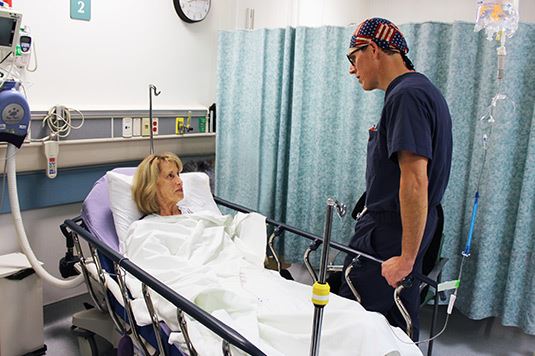
Open Accessibility Menu
Hide
dfh
Close Alert
Close Alert
Author: John Dearborn, MD
Specialty: Orthopaedic Surgery

The impact chronic hip pain has on your quality of life is undeniable. Your ability to work, be self-sufficient, and even navigate your home can be impacted when you live with chronic hip pain. If this sounds like you, hip replacement surgery may be a good option.
Since it is an elective procedure, patients considering hip replacement have the opportunity to do their homework, to find the surgeon and program offering the highest quality of care and posting the best outcomes. Part of that means knowing what questions to ask your orthopedic surgeon before entering the operating room.
What is your experience with this procedure?
Just because a surgeon is able to perform a surgery, that doesn’t
mean he or she is proficient at it. Find out how many of these procedures
they typically perform in a year. And if something goes wrong, are they
comfortable fixing the problem or do they refer “redos” somewhere
else? What materials does the surgeon use? Is there a recommended surgical
approach, and if so, why? What safeguards are in place to minimize the risks?
In a typical orthopedic practice, a surgeon might do a dozen hip replacements
a year. Compare that to the IJRR, where, between Dr. Sah and myself, we
typically perform more than three dozen total hip replacements each
month. From a patient perspective, this is a good thing. We’ve seen enough
cases to perfect our craft , which means a substantial reduction in complications.
On the flip side, we have seen what can go wrong and we know how to rectify it.
Total hip replacement involves removing damaged joint surfaces and replacing them with metal and plastic implants. In evolution since the 1960s, traditional hip replacement surgery still involves a 5- to 10-inch incision, a lengthy hospital stay and months of rehab. I introduced the West Coast to less invasive hip surgery methods in 2001 and we currently offer these techniques to nearly all of our patients at Washington Hospital’s Institute for Joint Restoration and Research. The procedure involves less muscle damage, as well as reduced pain, hospital stay and recovery time.
What are possible short- and long-term complications?
One of the potential complications for any surgery is infection. In joint replacement, infections require additional surgery, prolong recovery and impact the ultimate performance of the implant. So, when meeting with your orthopedic surgeon, ask them about their infection rates and be prepared to cross-reference those with an objective third-party source. Inquire about other complications as well, including blood clots and what they do to prevent them.
If they’re not able to provide complication data, you can do your due diligence with online resources like Healthgrades. Washington Hospital has received both the America’s 100 Best Hospitals for Joint Replacement Award and the America’s 100 Best Hospitals for Orthopedic Surgery Award from Healthgrades. This means our program has been independently evaluated and recognized for superior patient outcomes.
While the potential for complications shouldn’t prevent a patient from having hip replacement, it’s smart to have realistic expectations going into it. Learn more about how this pre-operation education component equates to successful outcomes for patients of the Institute for Joint Restoration and Research.
What can I expect after this procedure?
At the IJRR, patients who are in surgery in the morning are up walking (with assistance) or even discharged by the afternoon. But recovery isn’t a straight line. The time it takes to fully recover depends on a number of factors, such as surgical technique, your health before the surgery, and how well you stick to the post-surgical recovery plan.
Typically, this recovery plan includes:
The best joint replacement programs will create a recovery roadmap specific to your individual needs. The goal is to help you heal and return to normal life, and to reduce the risk of post-operation complications. Ultimately, recovery plans should prepare patients and caregivers for the physical and mental highs and lows that inevitably happen even during a normal recovery.
Each year, more than 300,000 total hip replacement surgeries are performed in the United States. With an aging baby boomer population, increasing rates in the diagnosis and treatment of arthritis, and improvements in life expectancy as well as quality of life, that figure will only go up.
If chronic hip pain due to arthritis or injury have you seeking surgical treatment options, the best thing you can do to ensure the most successful outcome is to become an advocate for your health – that means not being afraid to ask questions. A good surgeon will answer your questions, set clear expectations and justify risks, and get you back to a healthy, mobile, pain-free life.
Posted August, 2018